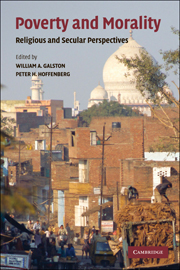Book contents
- Frontmatter
- Contents
- Contributors
- Acknowledgments
- 1 Introduction
- 2 Global Poverty and Unequal Development
- 3 The Karma of Poverty
- 4 Poverty and Morality in Christianity
- 5 Classical Liberalism, Poverty, and Morality
- 6 Confucian Perspectives on Poverty and Morality
- 7 Poverty and Morality
- 8 Hinduism and Poverty
- 9 The Problem of Poverty in Islamic Ethics
- 10 Jewish Perspectives on Poverty
- 11 Liberal Egalitarianism and Poverty
- 12 Marxism and Poverty
- 13 Poverty and Natural Law
- 14 Afterword
- Select Bibliography
- Index
- References
9 - The Problem of Poverty in Islamic Ethics
Published online by Cambridge University Press: 05 June 2012
- Frontmatter
- Contents
- Contributors
- Acknowledgments
- 1 Introduction
- 2 Global Poverty and Unequal Development
- 3 The Karma of Poverty
- 4 Poverty and Morality in Christianity
- 5 Classical Liberalism, Poverty, and Morality
- 6 Confucian Perspectives on Poverty and Morality
- 7 Poverty and Morality
- 8 Hinduism and Poverty
- 9 The Problem of Poverty in Islamic Ethics
- 10 Jewish Perspectives on Poverty
- 11 Liberal Egalitarianism and Poverty
- 12 Marxism and Poverty
- 13 Poverty and Natural Law
- 14 Afterword
- Select Bibliography
- Index
- References
Summary
The problem of poverty occupies a central place in Islamic ethics. Indeed, it is arguably the first social issue that the Qur’an addresses, beginning with some of the earliest revelations received by the prophet Muhammad. The claims of the poor and the obligations of the wealthy are moral issues taken up by hundreds of Qur’anic verses. Likewise, the hadith literature is rich in moral admonitions and practical instructions that reflect, according to Islamic tradition, the Prophet’s teachings and reforms on this subject. Two of Islam’s five pillars of faith bear directly or indirectly on the issue of poverty: zakat, which is the duty of the rich to pay alms to the poor; and sawm, or fasting during the month of Ramadan, which is intended in part to cultivate empathy for the destitute. Islamic law devotes considerable attention to the institution of waqf, or charitable trusts, which has provided the foundation for Muslim philanthropy over the past thirteen centuries.
The centrality of poverty and its alleviation in the earliest Islamic sources no doubt reflects the importance of this issue in the seventh-century Arabian society in which Islam emerged. Yet the problem of poverty in Islam has never been more acute than at present, with Muslims constituting large numbers of the world’s poorest. Stagnant economies, chronic unemployment or underemployment of young people, and corrupt or inept governments that pilfer or mismanage development funds have all factored into Islamic revivalism. One of the most prominent intellectual aspects of this revivalism is the development during the past fifty years of “Islamic economics.” Social justice concerns – the argument that Islamic ethics have become divorced from economic practices because of Muslim infatuation with Western ideologies and institutions – underlie the burgeoning literature of Islamic economics. If there is a central thesis in this literature it is that the Islamic economic system is neither entirely laissez faire capitalism nor classless, propertyless communism. The ideal Islamic system lies somewhere in between, ranging in the arguments of theorists from a liberal welfare state to a more interventionist socialist state.
- Type
- Chapter
- Information
- Poverty and MoralityReligious and Secular Perspectives, pp. 180 - 203Publisher: Cambridge University PressPrint publication year: 2010

